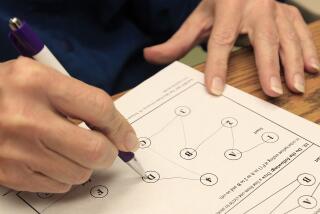When the Exam Fails Students : Fairer, better SAT tests would be a boon for higher education
- Share via
The Scholastic Aptitude Test, a requirement for the college-bound, may soon get a much needed overhaul. College Board trustees are expected to vote next month on proposed revisions of the standardized test, which measures general math and verbal skills. The revamping, the biggest in 50 years, is long overdue.
The changes probably won’t make the rigorous exam any less difficult, but the revisions are bound to include more relevant information and address complaints that the test is biased against women and minorities.
Nearly 2 million high school juniors and seniors annually take the SAT in search of a high score--1,600 is perfect--that will open the door to college. The College Board, which administers the test, claims that it is an indicator of future academic success. Critics complain the exam is biased in content and form. On that point, a federal judge ruled last year that New York state discriminated against women when it used SAT scores to award scholarships.
Girls tend to score lower than boys on the SAT, although young women tend to get better grades in high school and college. Educators who believe the test under-predicts female achievement specifically criticize the multiple-choice format and the content of some questions.
Multiple-choice tests hint at answers, encourage guessing and reward quick decisions. They also lend themselves to expensive test-coaching courses that emphasize speed and test-taking tricks. The new SAT would include some math questions without multiple-choice answers. That skills-oriented approach might more accurately measure math ability. The exam would test vocabulary by having students read passages of writing. That could also provide a better measure of critical thinking and classroom abilities.
The new test may also feature an essay question as a measure of writing proficiency. College administrators applaud that proposal, but some Asian and Latino educators believe the requirement would penalize students for whom English is a second language. To ward off further complaints about ethnic bias, the Educational Testing Service will need to proceed carefully.
The College Board denies any bias, but the examiners cannot deny the gap in scores between white males, and black and Latino students. The revision process will provide an opportunity to address that concern.
Excelling on the SAT can make a profound difference in a young person’s future. Every student deserves a fair shot at success.
More to Read
Sign up for Essential California
The most important California stories and recommendations in your inbox every morning.
You may occasionally receive promotional content from the Los Angeles Times.










